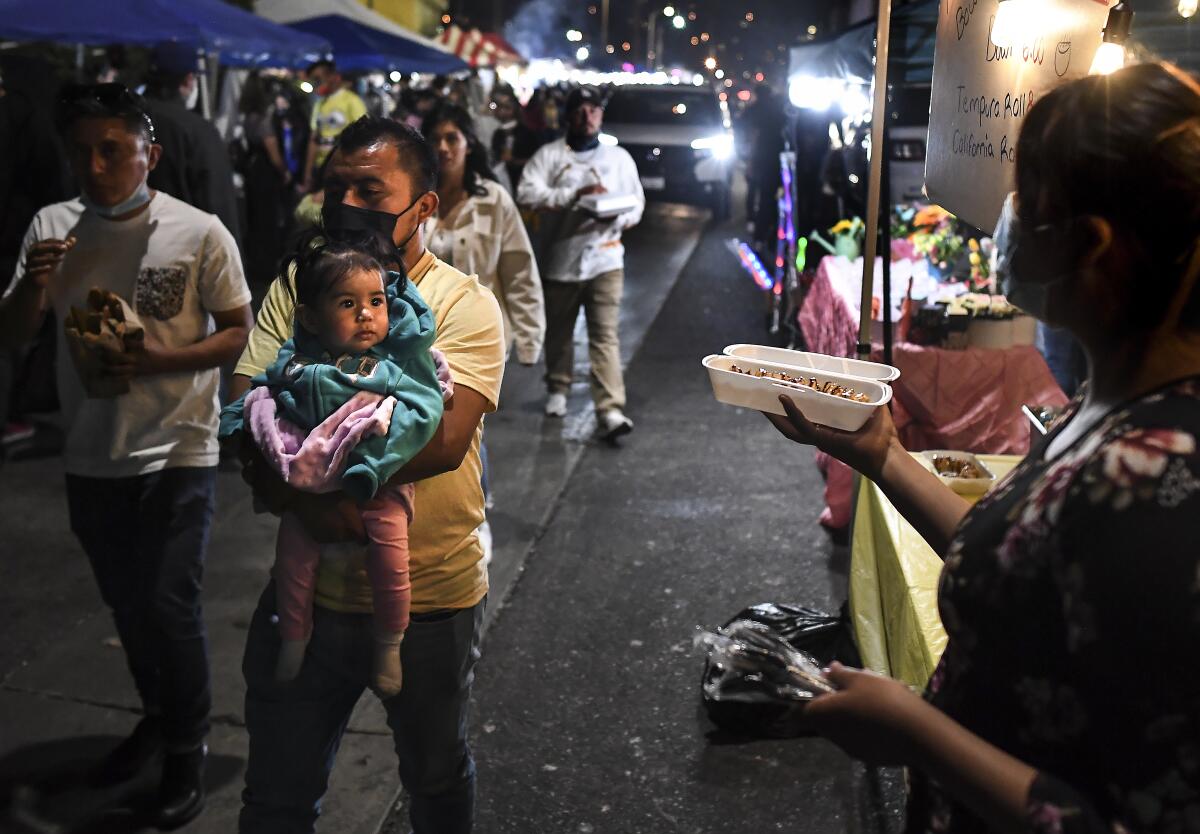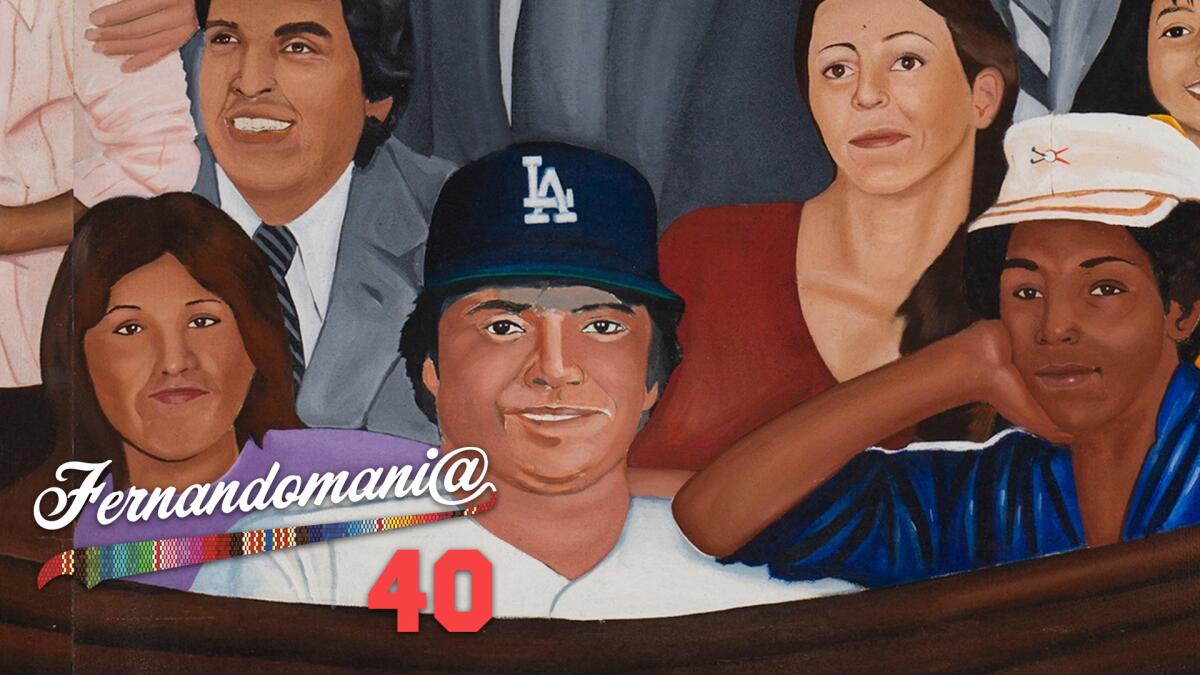Latinx Files: What will happen next with the Avenue 26 night market?

They say that necessity is the mother of invention.
That truism, though tired, certainly applies to the rise of the Avenue 26 night market, a popular bazaar that sprung up during the pandemic in the Lincoln Heights neighborhood.
Hundreds of mostly Latinx vendors in need of staying afloat financially during the ongoing global pandemic set up shop alongside an industrial street, and each night thousands of people wanting a distraction from a world shutdown showed up to buy their food, drinks and assorted wares.
As time went on, TikTokers got wind of the Avenue 26 night market and spread the digital word. That drew a larger crowd, which attracted even more vendors. It got so big that my colleague Brittny Mejia likened it in a May feature story to a “temporary town” with its own form of self-governance. It wasn’t exactly legal, but officials looked the other way.
At least they did until the neighbors complained.
“On weekends, you’re a prisoner in your own home,” a utility company technician who lives in the area recently told Los Angeles Times columnist Steve Lopez. Residents bemoaned waking up to streets covered in “freshly dumped trash, puddles of urine and human feces.”
Last Thursday, two days after Lopez’s column was published, city workers installed fencing and concrete barriers that blocked access to the stretch of street where merchants set up their makeshift stands. City Councilman Gil Cedillo, who represents the area, confirmed that he had ordered the shutdown.
“We support the economic opportunity that night markets provide to vendors and the culinary experiences it provides to consumers,” read a news release. “However, it is unacceptable the way this site has negatively impacted the quality of life of Lincoln Heights residents and businesses. … Our duty is to maintain clean, safe, and secure neighborhoods.”
But this is just a temporary fix.
The Latinx experience chronicled
Get the Latinx Files newsletter for stories that capture the multitudes within our communities.
You may occasionally receive promotional content from the Los Angeles Times.
The Avenue 26 night market’s original location might be closed, but vendors haven’t gone anywhere. L.A. Taco reports that several of them have moved to a nearby street, while organizers try to work out a more viable solution with Cedillo’s office.
“We understand there is a right way to do things, from pulling out all the necessary permits to complying with city laws and regulations; we are willing to do it all,” Luis Peralta, who ran a candy stand at the bazaar, wrote in a letter to the city official.
“We just need help from people like yourself who can create a dialogue with the surrounding community to find solutions for their wants and needs as for ours.”
So far, those pleas for help have been met with indifference. Cedillo reportedly skipped a Tuesday meeting with vendors, and when his aides were told of their plans, they reportedly responded with, “Do what you have to do.”
Given their necessity, the vendors will do exactly that.
Our daily news podcast
If you’re a fan of this newsletter, you’ll probably love our new daily podcast, “The Times,” hosted by columnist Gustavo Arellano, along with reporters from across our newsroom. Every weekday, it takes you beyond the headlines. Subscribe on Apple Podcasts and follow on Spotify.
Fernandomania @ 40: How Fernando Valenzuela’s mound artistry inspired other artists

The latest installment of our multi-part documentary series “Fernandomania @ 40” is out today. You can watch here.
While Fernandomania energized Los Angeles, it also sparked the creativity of the city’s artistic community. Artist Barbara Carrasco celebrated the pitcher in her landmark mural “L.A. History: A Mexican Perspective;” playwrights Richard Montoya and Judy Soo Hoo tapped into Valenzuela’s mystical powers in “Chavez Ravine” and “Sandi Koto of the San Gabriel Valley;” and musician Steve Wynn reflected on the pitcher and the frenzy surrounding him on “Fernando,” a song he penned for the Baseball Project.
Missed an episode of “Fernandomania @ 40”? You can find them all here.
Consider subscribing to the Los Angeles Times
Your support helps us deliver the news that matters most. Become a subscriber.
Things we read this week that we think you should read.
— In case you missed it: For the Atlantic, Meaghan Winter wrote about Latinxs being the fastest growing group of Evangelicals, and how they might represent the future of the American conservative movement.
— Street vending has been legalized in Los Angeles for some time now, but as Scott Cummings, a UCLA School of Law professor, and Doug Smith, a supervising senior staff attorney in the Community Development Project at Public Counsel, note in this Times op-ed, the archaic rules in place all make it nearly impossible and prohibitively expensive for a vendor to get a permit.
— Isabelia Herrera of the New York Times has this positive review of “Loud,” a Spotify podcast co-produced with Futuro Studios and narrated by the legendary Ivy Queen about the history of reggaeton. The 10-episode series, Herrera says, does a great job at unpacking the complex history of the genre — from its roots in Panama to its vilification and then later broader acceptance. You can find the podcast here.
— Staff writer Daniel Hernandez recently sat down with filmmaker Robert Rodriguez to talk about his career and the new deal he signed with HBO Max. Rodriguez, who’s Mexican American, says his decision to make films with Mexican cultural signifiers was at least partially inspired by John Woo.
“I remember when I was in college, I saw a bunch of John Woo movies that were really big, and you’d walk out of that movie theater wanting to be Chinese. You wanted to be Chow Yun-Fat,” Rodriguez said. “It was because of how he was portrayed as a hero. I thought, ‘I want to do that with Hispanics. I want to do that with Mexicans.’”
The Latinx experience chronicled
Get the Latinx Files newsletter for stories that capture the multitudes within our communities.
You may occasionally receive promotional content from the Los Angeles Times.




